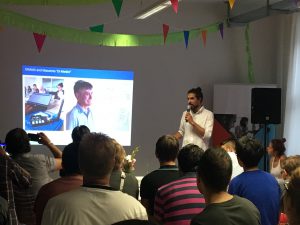This summer Professor Höhn, Jessica Schwed, and I traveled to Berlin, Germany in an effort to better understand the refugee situation there, while also exploring avenues for project collaboration between various German institutions and Vassar College.
Between 2015 and 2016, around 1,210,000 people arrived in Germany, the majority of whom came from Syria, Iraq, and Afghanistan. By the end of 2015, 79,000 people had arrived in Berlin alone. 54,000 of these arrivals were granted permission to stay, which was 11 times the projected federal distribution quota.
Of particular significance to our project is the terminology used to refer to the “refugee crisis.” The term “refugee” refers to the legal status of an individual who has applied for and received asylum, therefore granting them refugee status. Through our work here, we have found that terms such as newcomers, forcibly displaced individuals, and people with a migration background are considered more politically correct. Though many of the individuals we met detest the term “refugee,” others feel they have earned the title and Additionally, what is coined the “refugee crisis” actually reflects and should be described as an administrative or political crisis. For the sake of clarity, I use the term “refugee” below.
To get us started, we attended three major workshops/conferences. Our first, at Bard College Berlin, allowed our team to learn about and discuss the various initiatives at Bard College Berlin, Sarah Lawrence College, Colgate University, Hamilton College, Hobart and Williams Smith Colleges, and Vassar College in an effort to identify points of collaboration regarding the refugee situation and receive feedback. The following 11-day intensive workshop organized for faculty in the U.S., “Germany, Europe, and the Refugee Crisis: The Challenge to Integrate,” provided us with a comprehensive overview of the refugee situation in Germany. During this time, we attended lectures by the Friedrich Ebert Foundation (associated with the Social Democratic Party), the Heinrich Böll Foundation (associated with the Green Party), the Migrant Welcome Center at Potsdamer Strasse, the Malteser Refugee Center ICC (a refugee shelter), the Chamber of Commerce and Industry, Federation of German Unions, Die KAUSA Servicestelle Berlin (which provides technical training for “newcomers”), the Arab-German Young Academy of Sciences and Humanities, The German Academic Exchange Service (DAAD), the European Commission’s Representation in Germany, the Paritätischer Wohlfahrtsverband Hamburg (women’s center), and Humboldt University, among others. Not only did this workshop provide us with an immense amount of research material, we were also able to make key connections with many of these organizations and the U.S. professors that attended the conference. Our final workshop, Face It! Konferenz, put us in contact with more than 60 established non-governmental organizations working with refugees in Germany.
Undaunted by the intricate nature of Germany’s bureaucracy and geared up with excellent contacts, we hit the ground running. For the remainder of our time in Berlin we focused on identifying partnerships and planning feasible projects together. Of particular interest is our collaboration with Malteser Hilfsdienst and Malters Werk, one of Germany’s largest social service NGOs with offices across the globe. They run numerous emergency shelters for newly arriving refugees and homes for settled refugees in Germany. During our conferences we learned that many refugee women have a difficult time attending German language classes because of childcare responsibilities, so we began a partnership with Malteser in which we will coordinate with their existing refugee-German tandem project: German language professors and students in the United States will join in this buddy system and offer private, online tutoring sessions for women free of charge. The idea is that this makes German language learning more accessible to refugee women and provides an opportunity for cross-cultural relationships to form.
Our collaboration with the ReDI-School of Digital Integration might prove to be our most exciting yet. The ReDI-School is a non-profit digital school for tech-interested newcomers applying for asylum in Germany. Their programs offer students high-quality training and the chance to collaborate with the start-up and digital industry. Currently we have plans to offer Vassar courses to students enrolled at the ReDI-School as part of Vassar Refugee Solidarity’s Transnational Classroom project. This collaboration would enable Vassar students to learn alongside students in Berlin, fostering a more robust learning environment on both sides of the Atlantic. We also found incredible interest in our Arabic tutoring program called Conversations Unbound. Starting as a program within Vassar Refugee Solidarity, Conversations Unbound pairs students studying Arabic with tutors with a forcibly displaced background. The students have homework to practice their conversational Arabic online with their assigned tutor and the tutor receives payment for each session. From only two presentations at the ReDI School, we received over twenty tutor applications. By establishing this program at the ReDI School, we’re able to better institutionalize Conversations Unbound at Vassar College and expand to many more colleges and universities.
Finally, this research and on-the-ground exploration has equipped us with the knowledge to help craft and organize a course curriculum on forced migration and displacement for Vassar College and the institutions participating in the Consortium of Forced Migration, Displacement and Education.


